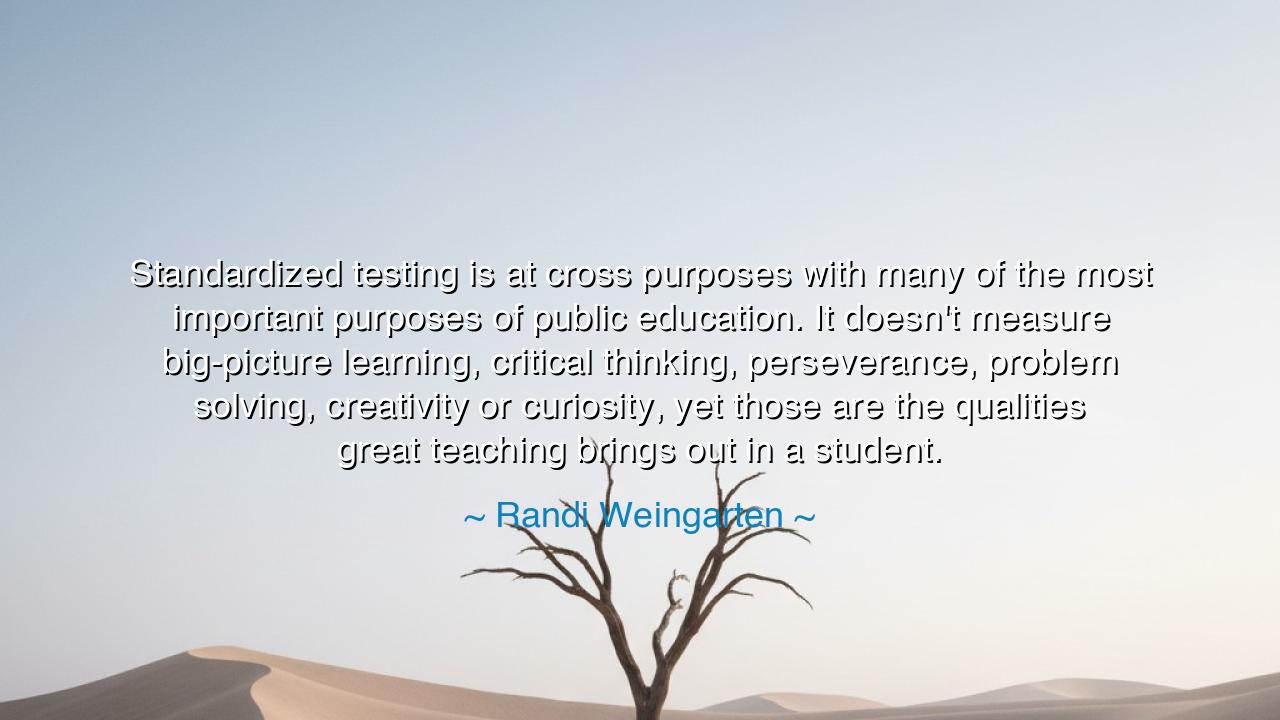
Standardized testing is at cross purposes with many of the most
Standardized testing is at cross purposes with many of the most important purposes of public education. It doesn't measure big-picture learning, critical thinking, perseverance, problem solving, creativity or curiosity, yet those are the qualities great teaching brings out in a student.






“Standardized testing is at cross purposes with many of the most important purposes of public education. It doesn't measure big-picture learning, critical thinking, perseverance, problem solving, creativity or curiosity, yet those are the qualities great teaching brings out in a student.” — Randi Weingarten
In this saying, Randi Weingarten, a guardian of learning and advocate for teachers, speaks of a profound rift between the spirit of education and the machinery that has come to dominate it. Her words strike like a bell in a forgotten temple—reminding us that the true aim of learning is not the memorization of answers, but the awakening of the mind. She warns that the system meant to measure progress has become a shadow that obscures the very light it was meant to reveal. When we bind the minds of the young to rigid measures, we rob them of the boundless curiosity and creativity that are the heart of all true wisdom.
In the ancient world, the masters of thought never gave their pupils tests of numbers and bubbles to fill. Socrates taught through questions, not through forms. He did not seek a perfect score, but a restless mind that would not cease to ask why. Confucius instructed his disciples to reflect, to live virtuously, to harmonize knowledge with conduct. To these teachers, learning was a sacred path, a way to sharpen the soul. They knew that wisdom cannot be weighed, nor can the fire of insight be confined to paper. Yet in our age, the sacred has been replaced by the mechanical; we measure intellect not by its depth but by its conformity.
Weingarten’s lament is not a cry against order or discipline, but against the loss of purpose. Education, she reminds us, was meant to shape citizens, not merely workers—to cultivate critical thinking, problem solving, and perseverance, not to reward quick recall or passive obedience. The standardized test, in its cold precision, measures how well a student fits the pattern, but not how brightly they can imagine beyond it. It values correctness over curiosity, and so the young, once filled with wonder, learn instead to fear mistakes. Thus, the flame that could light a thousand discoveries is quietly dimmed.
Consider the tale of Albert Einstein, a boy who could not bear the dull rhythms of his schooling. His teachers deemed him slow, unfocused, unpromising. He failed the entrance exam to his first school of science. Yet his curiosity, his hunger to understand the nature of the universe, would not be measured by their tests. Years later, he would reshape our understanding of time and space. What the test could not see was the power of a mind unwilling to accept easy answers. Einstein himself once said, “Imagination is more important than knowledge.” Thus we see that standardization and genius often dwell at odds.
But this truth reaches beyond the classroom. Every generation must choose whether it will raise obedient test-takers or free thinkers. The empires of the past that rose on conformity—be it Sparta’s harsh discipline or Rome’s bureaucratic rigor—eventually fell, while those that cherished the arts and inquiry left legacies that still inspire. It is not the rote student who shapes the world, but the one who dares to question it. The purpose of education is not to fill vessels, but to light torches, and a torch cannot be lit by measuring its shadow.
Therefore, let the teachers of the earth remember: you are not merely instructors, but builders of souls. Let every lesson be an act of liberation, not confinement. Ask your students not only what they know, but what they dream, what they wonder, what they wish to create. Let them fail, and in failure, let them learn the art of rising again. Teach them not the path to the right answer, but the courage to seek the truth.
And to those who learn—be not dismayed if your worth cannot be written in a score. The greatest minds of history were often misunderstood in their time. Hold fast to your curiosity, for it is the truest compass of growth. Cultivate creativity, even when rules would chain it. Persevere in thought, for the mind that questions is the mind that changes the world. Remember this teaching: education is not a test—it is a transformation. The wise learn not to please the examiners, but to expand the horizon of what it means to be human.






AAdministratorAdministrator
Welcome, honored guests. Please leave a comment, we will respond soon